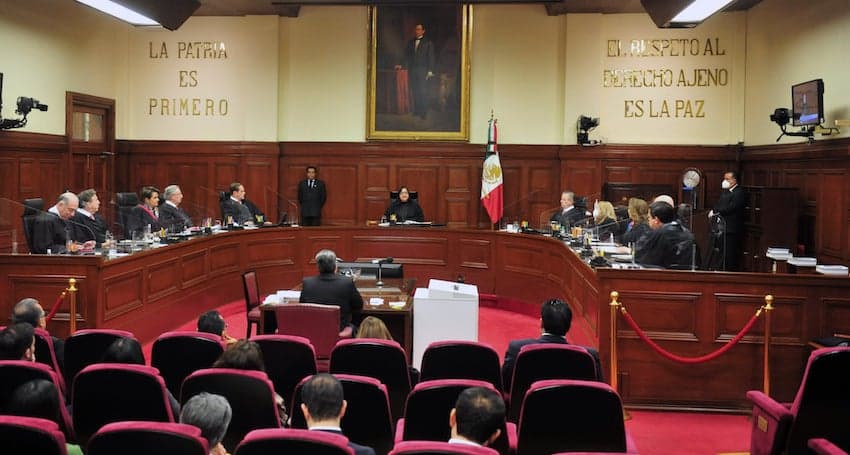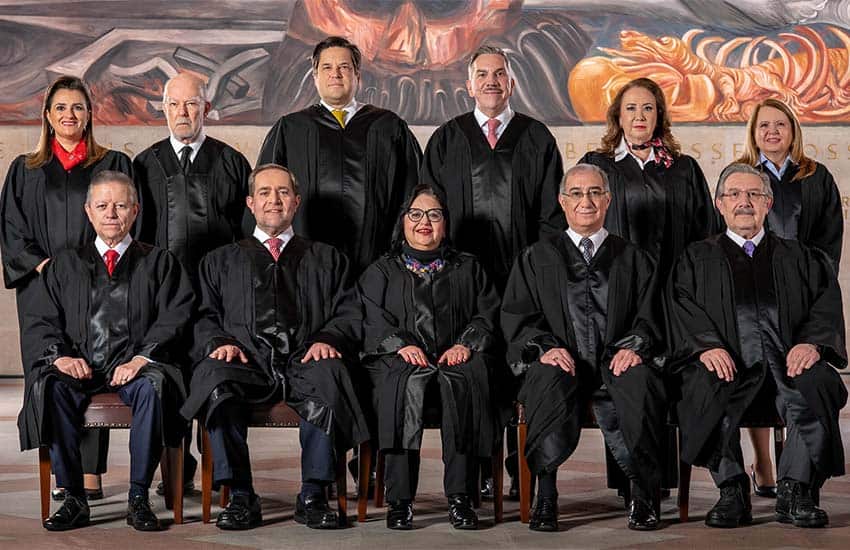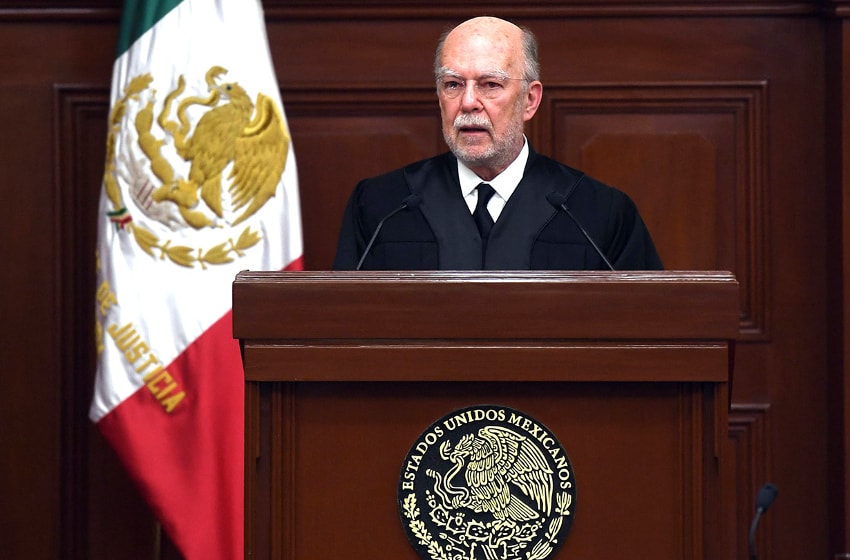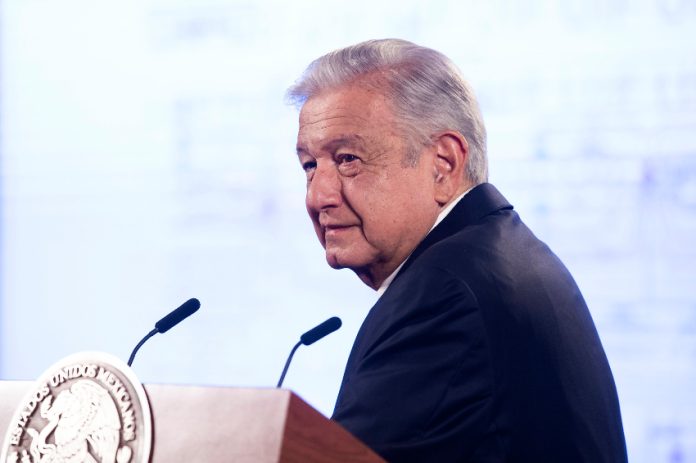Another battle in the war between the federal government and Mexico’s top court played out on Thursday.
President López Obrador responded to a Supreme Court (SCJN) ruling against a 2021 decree that sought to fast-track and protect the federal government’s infrastructure projects by issuing a new similar decree.

The Supreme Court ruled Thursday that a decree issued by the president in November 2021 that established the government’s infrastructure projects as matters of public interest and national security is unconstitutional.
That decree shielded from legal challenges and scrutiny the construction of infrastructure projects in a wide range of sectors, including transportation, telecommunications, customs, water, tourism, health, the environment and energy. It also instructed government agencies to grant provisional authorizations and permits to projects deemed to be of public interest and national security in a maximum period of five working days so as to ensure their timely execution.
The incomplete Maya Train railroad and the Felipe Ángeles International Airport, which began operations in March 2022, were among the government projects whose construction was affected by the issuance of court orders against them before the 2021 decree was published.
On Thursday morning, eight of 11 SCJN injustices voted in favor of invalidating López Obrador’s 2021 decree. The court is scheduled to consider specific parts of the document on Monday.

The court said in a statement that the first article of the decree broadened the range of information that can be reserved by the government. The change was made “via an administrative act” rather than through the law and thus contravened the constitution, the SCJN said.
Among other justifications for its ruling, the Supreme Court said that the decree “restricted the authority” of the National Transparency Institute (INAI) to “guarantee compliance with its transparency obligations.”
The court’s ruling came in response to a lawsuit filed by INAI, which argued that the decree violated people’s right to access information and that the government exceeded its powers by publishing it.
Justice Juan Luis González Alcántara, who proposed the invalidation of the decree to his colleagues, said there were “sufficient arguments” to reach the conclusion that there was a negative impact on the right to access information.

The decree is “unconstitutional” because its “breadth and ambiguity hinder and inhibit access to information … with respect to projects of the government of Mexico,” he said.
Hours after the court handed down its decision, López Obrador published a new decree in the government’s official gazette that established a narrower range of infrastructure projects and assets as matters of national security and public interest.
Those covered are the Maya Train railroad, the Isthmus of Tehuantepec trade corridor and the Palenque, Chetumal and Tulum airports. The railroad, trade corridor and Tulum airport are currently under construction, while the Palenque and Chetumal airports are operated by the government.
The new decree said that the “construction, operation [and] maintenance” of the projects and assets are matters of national security and public interest.
“Mexico, being one of the largest countries of the world [in area] and the 11th most populated, is exposed to multiple risks and threats including uncontrolled migration flows, organized crime, government corruption, climate change, disturbing phenomenons, the collapse of strategic facilities or critical infrastructure … and problems at the southern and northern border,” it said.

The decree said that the Isthmus of Tehuantepec interoceanic corridor and associated infrastructure are “strategic” due to their location between the Pacific Ocean and the Gulf of Mexico.
Due to their geographical location, the Palenque, Chetumal and Tulum airports are “strategic for surveillance and control of airspace at the southern border, which allows the detection and timely interception of unidentified aircraft that could carry out illegal acts … [that threaten] national security and territorial integrity,” the decree said.
The Maya Train railroad was described as “the most important project of infrastructure, socio-economic development and tourism in the present six-year period of government.”
In a separate designation last year, the government’s National Security Council (CSN) established the Maya Train railroad as a project of national security, a move also designed to prevent it from being stopped or delayed by legal challenges. The CSN made a similar designation for the Isthmus of Tehuantepec trade corridor earlier this month.
López Obrador on Friday said that protecting the five government projects and assets was essential to prevent “senseless, irresponsible, corrupt” and “unpatriotic” people from stopping them, “as has been their intention.”
The development of Mexico’s southeast would be adversely affected if projects under construction are stopped by the “caprices of these fifís corruptos,” or the corrupt elite, he said.
López Obrador asserted that groups that have applied for injunctions against government infrastructure projects are funded by the United States government.
He also asserted that there is no provision in his new decree to “deny information” about the government’s projects and dismissed claims that he wanted to conceal information about the Maya Train, including its cost, because the project is tainted by corruption.

“No, we’re not the same, we’re not corrupt. What I consider most important is honesty,” López Obrador said
Establishing the projects as matters of national security and public interest doesn’t mean that information won’t be released about them, he emphasized.
The SCJN’s ruling against the president’s 2021 decree came 10 days after it struck down part of a controversial electoral reform package.
Last month, it ruled that the transfer of control over the National Guard from the civilian Security Ministry to the Defense Ministry was unconstitutional, a decision López Obrador asserted was based on political bias rather than legal criteria.
The president accuses the Supreme Court, and the broader judiciary, of being “rotten” and at the service of criminals and the country’s powerful elite rather than “the people.”
He said last week that he intends to propose a constitutional change so that citizens are tasked with electing the country’s Supreme Court justices and other judges. The success of such a proposal hinges on the ruling Morena party and its allies winning a congressional supermajority at next year’s federal elections.
INAI is not in a position to launch a legal challenge against López Obrador’s new decree because only four of the seven positions on its governing board, or pleno, are currently filled due to the federal Senate’s failure to appoint three new commissioners.
The transparency institute’s pleno – which cannot currently convene because it has one fewer commissioner than quorum – is the only INAI body with the authority to file the kind of lawsuit required to challenge the latest decree.
INAI, which has been described as “useless” by López Obrador, nevertheless said on Twitter that it is looking at “legal mechanisms to defend transparency and the right to access information about federal government infrastructure projects in the face of the new decree from the executive.”
With reports from El Financiero, El País, Reforma and El Universal
